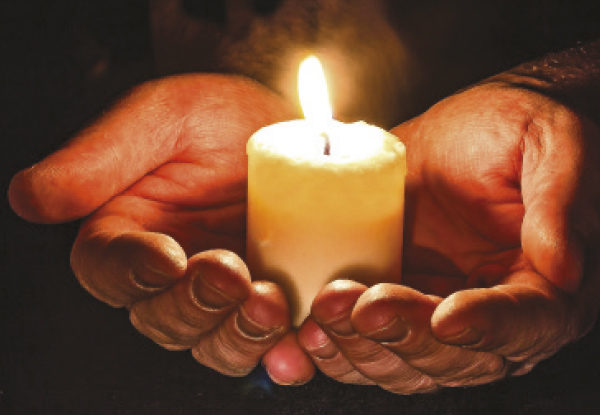
By Dermot Carmody
Christmas can be a wonderful time of the year. It’s a time for family and parties, for celebration and happiness. The winter festival can be a welcome blaze of light in the dark winter months.
For some of us, however, it can also be a difficult time if our own feelings and experiences are out of tune with seasonal expectations of general joy and laughter. In particular, it can be a challenging time for anyone who is dealing with the loss of a loved one. So what can we do to help us cope with grief amidst what can sometimes feel like the enforced jollity and togetherness of Christmas?
Orla Keegan, who is Head of Education and Bereavement at The Irish Hospice Foundation, explains that Christmas is a time that can stir up emotions in all of us. Most of us have strong childhood memories of Christmas, either good or bad and if we have lost someone then Christmas with its family memories can be difficult.
She points out that if you’re coping with grief it can feel as if you are on the outside of what is always an idealised version of Christmas in the media. “It’s not just the day itself,” she observes, “It’s the run-up to it. If a person is grieving they grieve all the time, but there is an intensity about the Christmas period when you’re wondering ‘How will I get through it?’ It becomes a disproportionate dread.”
The loss of someone close to you is bound to be felt anew at Christmas as the traditions of that time come around, bringing with them the memories of what that person’s involvement used to be.
If it was they who set the table, hung up decorations or put up the Christmas tree, those events will make their loss felt acutely. And this is not only the case if it is the first Christmas without them, as Orla explains. “We tend to focus on the first Christmas after a loss, but it’s every Christmas. There’s huge pressure to be seen to have fun and sometimes you don’t really want to.”
The Irish Hospice Foundation advises anyone experiencing bereavement at Christmas to plan so you don’t get ambushed by Christmas emotions. Think about what traditions you want to forego or ones you want to maintain as a way of incorporating the memories of the person you’ve lost in a positive way into Christmas now and in future. Everybody is different and we all grieve in our own way and at our own times.
Everyone will have different preferences to consider what is meaningful and eventful for them. Some might like to attend a religious service, or visit friends. Others might decide against an elaborate Christmas celebration.
As well as being aware of possible emotional pitfalls, Orla points out that Christmas can still be a positive time when people come together and there is an opportunity to re-incorporate happy memories into the present celebration. “You could recall past happy Christmas memories. Christmas can be a positive time when people come together and it can help to remember and to incorporate those happy memories into the present celebration of Christmas.”
Orla stresses the importance of being kind and gentle with yourself. “It’s important to allow yourself to feel however you feel – whether that’s happy or sad.” It’s okay to feel how you feel and it’s also okay to be involved as much or as little in social events as you feel you want to be. “You could allow yourself little slices of things,” Orla suggests. “If you don’t feel you want to participate fully or for a long time, it’s okay to say ‘I will come along, but I won’t stay all day this year.’”
As well as being gentle with yourself, it’s also important to be sensitive to those around you who are also coping with a bereavement. “The big message to families is to be tolerant,” says Orla “Be kind to others as well as to yourself.”
In this context she also sounds a gentle warning relating to the strong connection, particularly in Ireland, between celebration and alcohol consumption. She suggests it’s a good idea to be aware of the danger adding to a potentially stressful situation: “Tempers and tensions can flare and excessive alcohol won’t help that.”
If you know that someone is coping with bereavement and might be struggling over the Christmas period, how can you best help them? It might be difficult to judge whether it is appropriate to say anything to them or to know whether they are quiet about their loss because they do not want to talk about it, or because they feel that others might not want them to talk about it.
Orla suggests that it is appropriate to reach out. “Don’t be afraid to name it. For example you might ask ‘How are you finding Christmas without Sharon?’” She also suggests that friends or relatives should not be discouraged if their initial offer of support is turned down.
Even if the recipient didn’t feel able to respond to that offer they may appreciate receiving another. “You might offer to meet up with someone for lunch, and they say ‘no’ so you stop asking,” Orla says, giving an example, “Just keep asking. For example you might suggest going for a walk instead. It’s about day-to-day gestures and taking care not to leave people isolated.”
Christmas can be a bittersweet time for most of us. Even if you have not suffered a bereavement recently, it can bring to mind memories of those who are not there anymore, or cause you to reflect sadly on other disappointments. Relationships that have ended, or disappointments in work or in family life all come into focus as the year ends and another begins.
But by realising that it may be a challenging time, planning ahead with how you will deal with things, and by being open to support from others, in your family or in the wider community, you can make it easier to cope.
For more information you can visit the Irish Hospice Foundations web site at www.bereaved.ie



